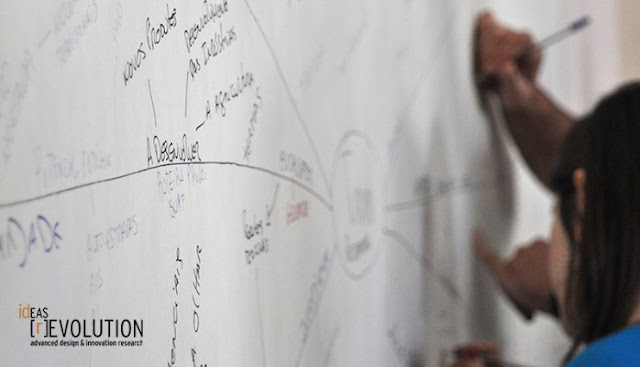The building blocks of relevance in education.
In today education sector and educational related business, defined by extremely competitive scenarios, internationalization as a key strategic driver.
Although, as soon we start to understand this, the question is: 'How to be or how to became an international player with relevance in our knowledge/professional areas?"
From our experience of developing since 2007 an unique design thinking for innovation methodology, we can clearly identify some fundamental building blocks to become more relevant that we will share with you:
- Encourage and produce distinct and unique knowledge;
- Build your reputation based on people and produce knowledge based on usefulness and 'real life contexts';
- Put the 'knowledge builders' - collaborators - in the centre of the process;
Going deepen in these building blocks, encouraging and producing distinct and unique knowledge means that everything you produce - content, models, patents or tools - must be innovative and with relevant content for society. Innovation and relevance are two important factors that attract 'young blood', experienced researchers and professionals to your ' knowledge sphere' with willingness to co-develop future developments.
Remember, knowledge isn't a closed and static dogma but rather an ongoing and continuously evolutionary process.

Build your reputation based on people and produce knowledge based on usefulness and 'real life contexts'. From our point of view, people are in the centre of the process. By putting this focus you will 'seduce' and attract high value students to your knowledge sphere that aim to develop their knowledge competences and skills connected with a more practical and real application approach, with a clear impact in their working life, professional paths and careers but also in their personal and professional development in short, medium and long run.
Put the 'knowledge builders' in the centre of the process by providing them space, time and invest in their internationalization. Internationalizing your collaborators, based on their merit and relevance will enable them to build their own academic and professional networks as well as developing their visions and missions. Then, your organization become more international due each person efforts where...
...the whole it is the sum of the parts.
Let them inspire and being inspired, be visionary researchers, passionate educators and attract followers, knowledge seekers and early adaptors of innovativeness and newism.
These building blocks were the strategy we followed for the development and internationalization of our research groupIDEAS(R)EVOLUTION.
Since 2007 we have been developing an unique Design Thinking methodology that brought an innovative and complementary approach to the traditional process. We were one of the first to internationally propose the introduction of 3 new stages in the traditional design thinking methodology: Involvement, Integration and Interaction.
Involvement stage has the main objective of leveraging the creative process through the increasing of stakeholder knowledge about Design Thinking, creative techniques to increase their willingness for creative process and information searching.

Integration stage has the main objective to experiment the resultant ideas, validate, improve and systematize for the delineation of strategy and the further integration in organization.
Interaction stage is focused on defining dissemination and dialogue strategies, network creation, information sharing among consumers and interaction measurement.
Also as a way of developing collective knowledge we encourage your participation identifying other building blocks that you consider relevant in this scope in the comments section.
With the dedication and effort of all the team we already attracted 3 international and 3 national students for PhD that are simultaneously IDEAS(R)EVOLUTION researchers:
- Fernando Mendes, founder of CoWork Lisboa and Design lecturer;
- Sofia Martins funder of GUDA and Design Lecturer;
- Heidi Weber lecturer in Media Design Barchelor and Intermedia Master in Fachhochschule Vorarlberg;
- Farley Milano lecturer in computational science and PhD candidate in New University of Lisbon;
- Wim Deplae master student in Management and PhD candidate at IADE;
- Pieter Sprangers, entrepreneur and lecturer in University of Antwerp;
We are now building and co-developing new models mixing knowledge from a wide range of backgrounds (innovation, marketing, design, design thinking, advertising, branding, business development, learning and entrepreneurship), experiences (students, lecturers, practitioners and academics) and nationalities (Portugal, Netherlands, Germany, Brazil and Turkey).
In short, you will not be a international relevant player being a 'me too' organization with classical and formal structures as the centre of your knowledge production.
You need, in your "knowledge sphere", collaborators and 'personas' with character, authenticity and with charisma!
Are these elements easy to find ?
The answer is NO!
That's why you need to know deeply your team, their motivations, ambitions, objectives and do not solely based on rankings, hierarchies of status but based on personality, values, creativity and human potential!
Join us in our prosecution of a changed the world for a better and greater good!




Comments
Post a Comment